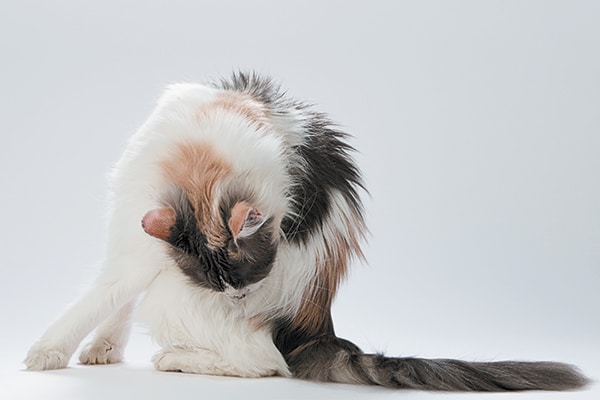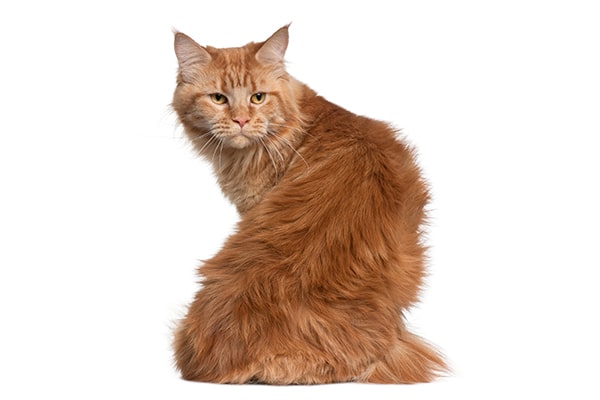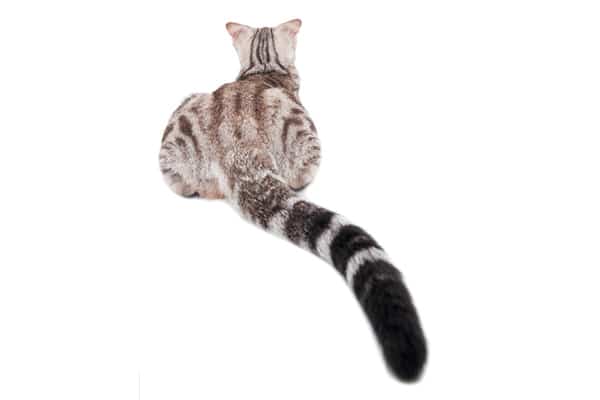What do a bunch of cat veterinarians talk about when they’re hanging out at a party together? Cat poop, of course, says Dr. Jean Hofve, holistic veterinarian, author, and founder of the site Little Big Cat. Why? Because the state of a cat’s poop is one of the fastest ways to help determine what might be wrong with an ailing kitty. Poop is important to your cat’s health, so it stands to reason that the place where it exits, the cat butt, would be, too. Here are four important things you should know about caring for the cat butt.

Dingleberries are just one cat butt problem. Photography ©LeventKonuk | Thinkstock.
1. Cat butt dingleberries
If you have a longhaired cat like my Romeo, you’ve probably seen little pieces of poop clinging to a cat butt now and then. It’s especially awesome when you discover this right after your cat has jumped up on your pillow and your face is two inches from the offending clump.
Dingleberries can occur if your cat’s poop is soft and is especially prevalent in cats with diarrhea. If your cat has the runs, it’s a good idea to get him checked by a vet right away.
The best thing to do to keep the berries at bay is to keep that cat butt trimmed of excess fur. You can carefully do this yourself or take your cat to the vet or groomer for a “sanitary trim.”
2. Should you wipe a cat butt?
Well, it depends. Does your the cat butt in question need wiping? Technically, your cat should be able to handle that himself, says Hofve. However, she adds, there are circumstances when he’s going to need some assistance.
- Soft poop: If your cat’s poop is softer than normal, it could stick to his bottom. Typically your cat gets to this himself, but he might not get it all so you may need to help.
- Overweight cats: If your cat’s overweight, it might be hard for him to reach all the way behind him to clean up, explains Hofve. That’s good incentive to get your chubby kitty on a diet, yes?
- Arthritic cats: If an older cat suffers from arthritis, he might also have trouble bending that far to get to his poop chute.
Warm water on a soft washcloth is the best way to clean a cat butt, Hofve advises. You can also use baby wipes or pet cleansing wipes like Earth Bath All Natural Cat Wipes, which I sometimes use.
Wipes are fine if your cat can’t reach his bum by himself at all. But if your cat can reach but simply hasn’t done such a bang-up job, just use plain water. You don’t want your cat licking himself and then ingesting chemicals, however mild, from the wipes.

Cat scooting is an indication that you should take your cat to the vet. Photography © GlobalP | iStock.
3. Cat scooting
We’ve all witnessed this common cat butt issue. Your cat hops out of the box and immediately plops down onto the floor and appears to be wiping his bum with your carpet. Or sometimes it may happen out of the blue. Regardless, no one wants to have to clean up skid marks from her light-colored Berber rug.
Cat scooting, though, is actually a good thing, because it indicates there’s an issue at hand. From diarrhea to allergies to worms, something’s going on back there and your cat’s scooting should tell you that he’s not feeling comfortable. If your cat is dragging his bum on the floor, take him for a visit with the vet.
4. Common health issues associated with the cat butt
Paying attention to what’s going on in your cat’s butt is a good idea. By knowing what’s coming out, you’ll be attuned to health issues. But also pay attention to the cat butt area itself. If there’s anything weird going on down there, get your kitty to the vet right away.
- One common problem you might experience with a cat butt is swollen anal glands. The anal glands, located on either side of the anal opening, secrete an important scent that coats the poop and is used for marking. A normal poop coming through the rectum puts just enough pressure on the glands to release the scent. But if a poop is too hard or too soft, it won’t prompt that release. Over time, the glands back up and become swollen and uncomfortable.
- You probably won’t be able to see the impacted glands because “they swell to the inside,” says Hofve. But, she says, “scooting is one of the signs that anal glands are impacted. Or your cat might be licking a lot at the area or doing strange yoga positions to try and get at it.”
- If your cat exhibits any of these behaviors, get him checked at the vet. If the issue is impacted anal glands, your vet will manually empty them. And, cautions Hofve, don’t try to express the glands yourself. Improper technique can create quite a mess.
- You also might periodically see little wiggling things (gag) in your cat’s poop or hanging out of the opening. If you do, get your cat to the vet right away. These are likely worms, and if they’re hanging out in the exit area, the problem is already advanced. In fact, if anything odd is hanging out of your cat’s butt or in his poop (like string, for example) take him to the vet. Even if the string appears to have come out completely, there may still be a piece inside your cat’s body. Your vet will do an X-ray or ultrasound to be sure no string is left, tangled up in your kitty’s organs.
Who knew the cat butt was such an important area? Staying up in your cat’s business will keep you aware and informed about the state of his health.
Tell us: What cat butt issues have you encountered?
Thumbnail: Photography ©Tomwang112 | Thinkstock.
This piece was originally published in 2012.
